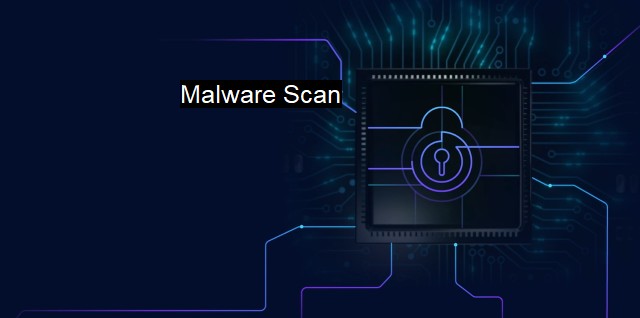What is Malware Scan?
Defending Your Device: The Importance and Function of Malware Scans in Cybersecurity
Malware Scan is a critical function within the context of cybersecurity and antivirus programming designed to protect computer systems and networks. It identifies, neutralizes, and eliminates threats posed by malicious software, commonly known as malware. The term "Malware" is defined as any piece of software that was specifically designed to cause damage to or disrupt the proper functionality of a system. This malicious software comes in various forms, including but not limited to viruses, trojans, worms, spyware, and ransomware.In the digital age, cybersecurity threats are prolific and evolving constantly to exploit vulnerabilities in system defenses. Consequently, malware scans have assumed a crucial role in keeping systems secure. It operates by checking each file in the system against a database of known threats, flagging suspicious or known harmful files for review or removal.
The database that a malware scan uses to identify threats is known as virus definitions, primarily housing samples of known malicious code. The scan compares the code within each file to the definitions list to flag any potential threats. Keeping these definitions up-to-date is indispensable, given that new malware threats emerge daily. Most modern antivirus software will update these definitions automatically, ensuring that even the most recent threats can be identified and neutralized effectively.
Most malware scans feature variations to cater to different needs. There are quick scans that cover the most vulnerable points within the system for threats, taking a relatively small amount of time. Full scans, on the other hand, involve the inspection of every single file within a system, requiring more time but increasing detection accuracy. Schedule scans allow the user to set up automatic scanning at regular intervals.
Powerful antivirus software can also perform a boot-time scan, which occurs when the computer is booting up. This process is crucial, as it allows the malware scanner to detect and remove threats before the operating system (and potentially the malware) is fully active, limiting potential damage.
Efficient malware scanners also employ heuristic analysis. This function enables the security software to identify, isolate and analyze suspicious files that do not match the known virus definitions but exhibit characteristics of malware. This proactive approach optimizes the detection of new or modified strains of existing malware, offering more comprehensive protection to the user.
Falling victim to malware can lead to severe consequences such as data loss, financial harm, privacy violation, or system damage. Therefore, regular use of a reliable malware scanner is strongly recommended for organisations and individuals. A robust cybersecurity strategy should incorporate malware scanning among its core components, particularly as cyber adversaries continue to grow more sophisticated, ambitious, and strategic in their approaches.
While it reassures one might feel that having malware scanning procedure in place will safeguard their systems, it is far from a complete solution. Malware scanning is just one aspect of a broader cybersecurity strategy. For utmost security, users should couple these scans with other practices such as regular system updates, efficient password management, email and internet browsing safety practices, and robust firewall settings.
a malware scan is a critical facet of cybersecurity, designed to identify, isolate and neutralize the threats posed by malicious software. Its significance is increasingly growing as digital threats keep evolving, prompting the constant developments seen in scanning techniques and antivirus technologies. Together with other targeted cybersecurity measures, malware scans help protect valuable data and maintain the integrity and functionality of systems in a landscape marked by persistent, evolving digital threats.

Malware Scan FAQs
What is a malware scan?
A malware scan is a cybersecurity procedure that scans a computer or device for any malicious software or code that can harm the system. It is an integral part of antivirus software that detects and removes malware from the device.Why is a malware scan important?
A malware scan is crucial in protecting your computer or device against cyber threats. Malware can cause significant damage to your system, including data breaches, theft of personal information, and system failure. Regular malware scans can help to identify and remove threats before they cause any damage.How often should I run a malware scan?
It is recommended that you run a malware scan at least once a week to ensure that your system is protected. However, the frequency of the scans may vary depending on your computer usage and the level of cybersecurity threats you face. For example, if you use the internet extensively for financial transactions or online shopping, it's best to run a malware scan more frequently.Can a malware scan detect all types of malware?
No, a malware scan cannot detect all types of malware. While a reputable antivirus software can detect and remove most types of malware, there are always new and sophisticated malware codes being developed that can evade detection. Therefore, it's recommended to keep your antivirus software up to date, use strong passwords, update your software regularly, and avoid clicking on suspicious links or downloading unverified files to minimize the risk of malware infection.| | A | | | B | | | C | | | D | | | E | | | F | | | G | | | H | | | I | | | J | | | K | | | L | | | M | |
| | N | | | O | | | P | | | Q | | | R | | | S | | | T | | | U | | | V | | | W | | | X | | | Y | | | Z | |
| | 1 | | | 2 | | | 3 | | | 4 | | | 7 | | | 8 | | |||||||